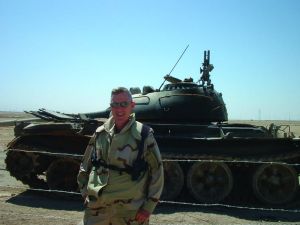
Tom Collins, a 33-year United States veteran who recently retired as a colonel, shared his experiences with Cabrini students on Sept. 2, discussing his military involvement in developing countries.
He spoke of the poverty-stricken conditions that have continued to stick in his mind and have ultimately changed his life.
Much of his military career was spent in the special forces but as a father of six children, one a student at Cabrini College, he realized that his age and family lifestyle was no longer suited for such activities and applied for a new position.
Collins was soon boarding planes as the captain of Civil Affairs. His mission was to organize civilian centers in war zones. Collins’ stories could have been days worth of information, rich in detail and emotionally challenging.
Haiti was the focus of Collins’ talk and not a single detail went uncovered.
He was stationed in Haiti to protect civilians in refugee camps after a coup d’etat in the 1990s.
When entering Haiti, the military holds two main agendas. One is to assist Non-Government -al Organizations in their work and the other is to keep the country’s government well involved.
While in small villages throughout Haiti, Collins’ team focused on long-term goals. The main goal was to provide needed security to civilians.
Collins’ new humanitarian role shaped his perspective and helped him to realize that a country only 600 miles from the U.S. was closer to an imaginative hell than what some call a home.
“The Haitian people deserved credit for waking up every day,” Collins said.
The harsh smells of “charcoal and dung” were the permanent stenches while Collins traveled throughout Haiti.
Setting up military-controlled medical stations was nothing short of nerve wracking and confusing.
At sunrise, Collins and his troops would form a line amongst those who were on the verge of death.
The job was to maintain peace and structure while the desperate people of Haiti waited to be seen by a medical professional.
“A green ribbon was tied from the front of the line to the middle. Those people were guaranteed to be seen. The middle portion of the line was identified with yellow ribbon. They were ‘maybes’ to be seen by medical experts. The end of the line, identified with a red ribbon, was an absolute no. That’s when chaos broke out,” Collins said.
Each patient that was seen was given the same three basic treatments: one to treat malaria-related infections, another for bacterial illness and one to control diarrhea caused by parasites.
If the diagnosis was beyond the control of these basic antibiotics, the doctors were given blank and disgusted stares, for the child in their arms were to die.
“It was giving these parents a personal death sentence for their child,” Collins said.
The idea of people traveling across war-infested villages to get treatment was impossible and simply not an answer.
Every time Collins helped, he was willing to face the consequences that came each time a helping hand was extended.
“I’m a smart person. I can read. I should have known about this crisis but I didn’t until I saw it,” Collins said. Today, over 10 years since Collins has been in Haiti, he continues to struggle with the idea of how a country can lack such basic needs and resources.


